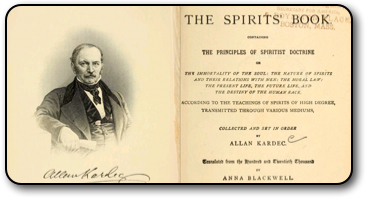
From
Manual espírita by "Bhima" (Francisco
I. Madero), 1911.
English translation by C.M. Mayo, from:
...Metaphysical
Odyssey Into the Mexican Revolution:
...Francisco I. Madero and His
Secret Book, Spiritist Manual
...By C.M. Mayo (Dancing
Chiva, 2014)

(APPROX
3 MINUTES 39 SECONDS)
ON THE
ORIGIN OF SPIRITISM
Q. Can you tell me something about the origin of Spiritism?
 A. Spiritism is as old the world, for
its philosophical doctrines, like the phenomena upon which they
are based, were known to the divine missionaries and by groups
of initiates that practiced these doctrines.
A. Spiritism is as old the world, for
its philosophical doctrines, like the phenomena upon which they
are based, were known to the divine missionaries and by groups
of initiates that practiced these doctrines.
Thus Krishna said to his disciples, "Long before throwing
off their mortal shell, the souls that have practised goodness
aquired the ability to communicate with those who have come before
them in spiritual life."
St. John the Evangelist (IV:1):"Dearly beloved, believe
not every spirit, but try the spirits if they be of God."
The doctrines of Socrates and other Greek philosophers, as with
the practices of the Druids of ancient Gaul and North America's
savage Indians, demonstrate that humanity has always believed
in the possibility of communicating with spirits and has always
been in communication with them.
Nevertheless, the ignorance of these peoples did not permit Spiritism
to be widely divulged; it was reserved for our modern rational
spirit of criticism and analysis to take from spiritist phenomena
the deductions that have formed the spiritist doctrine.
Modern Spiritism had its origin in the many noisy phenomena that
appeared simultaneously in various parts of the world.
It was not until the opportune time that a phalanx of spirits
knocked at the door of our material world, to prove to us their
existence, and thereby demonstrate the soul's immortality, and
give the fatal blow to the immoral materialist doctrines that
had begun to reign in the world.
The old religions, overloaded with useless rituals, having lost
their esoteric tradition, forgetting their essence, and having
converted themselves into instruments of domination instead of
serving as the refuge for the helpless, lost their prestige and
power, and were unable to stop materialism's dreadful advances.
Then, the Supreme Being, alert to the evolution of the worlds,
decided to reveal Spiritism to humanity.
The phenomena that appeared spontaneously could very soon be
invoked, thus permitting their study. Wise researchers observed
the laws these phenomena obeyed and from their deductions the
spiritist doctrine of which I have already made a brief review
resulted. I will endeavor to further develop this doctrine in
the following chapters.
Among these wise men, the name of Allan
Kardec stands out. A notable philosopher who lived in France
in the middle of the previous century, he was the founder of
the spiritist doctrine and its principal proponent by means of
a series of notable works titled What Is Spiritism; The
Spirits' Book; The Book on Mediums; The Gospel
Explained by the Spiritist Doctrine; Heaven and Hell;
and Genesis, which I recommend you read.

 A. Spiritism is as old the world, for
its philosophical doctrines, like the phenomena upon which they
are based, were known to the divine missionaries and by groups
of initiates that practiced these doctrines.
A. Spiritism is as old the world, for
its philosophical doctrines, like the phenomena upon which they
are based, were known to the divine missionaries and by groups
of initiates that practiced these doctrines.
